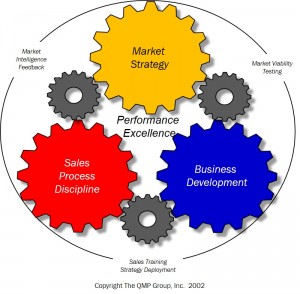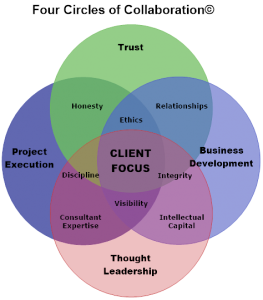When practicing consultants join the Institute of Management Consultants (IMC) and enthusiastically embark upon the journey to achieve Management Consulting Certification (CMC®), even the most experienced and confident consultants, with many years of professional and consulting experience under their belts, can temporarily stumble on the path. Given the myriad of requirements needed to achieve certification and the intellectual ability of the typical experienced consultant, it is somewhat surprising to find that the place on the path that they commonly stumble is, remarkably, in one the two required certification exams – the Ethics exam.
It is a not uncommon, and personally embarrassing. surprise for a senior experienced consultant to discover that his/her presumed unwavering and reliable ethical compass may not point true north at all times and under all circumstances. But, rest assured, they do recover quickly, adjust their understanding, and pass.
The exam result is a wakeup call. The good news is, that with a little bit of additional learning, coaching from IMC colleagues and deeper understanding, the potential for real-life ethical operator error is avoided and true north becomes easier to identify.
A Brief Background of CMC® Certification:
The Certified Management Consultant™ (CMC®) certification is awarded to those select consultants (only 10,000 worldwide) who have met global standards for practice competence, ethics, and results.
To put that 10,000 number in perspective, recent research done by one of our local Northwest Chapter Board members revealed roughly 8,000 professionals who designate themselves as consultants just in the greater Portland, OR area. If extrapolated, and adding in the number of organizations such as accounting firms, law firms, IT firms, engineering firms and the like, (who in reality are many times acting as advisory consultants), the number skyrockets. This leads to the likely conclusion that, in all likelihood, less than 1% of consultants worldwide are actually Certified in the practice of Consulting.
The IMC Certification process, which culminates with the bestowing of CMC® (Certified Management Consultant) designation to a member is, undoubtedly, a rigorous process. It is, nonetheless, eminently achievable by those willing to dedicate the time, study and effort required. The good news is that, unlike my college fraternity, there is no physical hazing or need to stand barefoot in the snow with beer poured on your head. (Or was that just a bad dream?)
But back to the point. The CMC® rigor is intellectual, requiring the compilation and proof of:
– Experience: reinforced by client recommendations, professional expertise and stature, thought leadership, case studies and testimonials
– Practice Competency – in managing client engagements, client relationships and your business practice disciplines
– Understanding: proven by the requirement to pass two written exams – one covering a Core Body of Knowledge and the other IMC Ethics, and
– An Oral Defense: of your petition for certification before a 3-person panel of senior Certified CMC’s
What are IMC Ethics and what creates the challenges?
The IMC Code of Ethics can be found on the IMC organizational website at http://www.imcusa.org/default.asp?page=ETHICSCODE . They won’t be repeated here.
But reading them and understanding their applicability under real life business circumstances are two different things. It’s in the real life application that the challenges are created and the scenarios presented in the exam truly challenge the taker.
The challenges of IMC-level ethics in real life can be illustrated in the points below.
- Sometimes they demand we sublimate our personal self-interest
Most client-related ethical circumstances consultants come in contact with present us a pretty clear black and white set of ethical decisions – and some actually bring us the opportunity to do our job better. For example: If we are an environmental consultant hired to verify the chemical levels of our client’s factory effluent the ethics are clear. If the effluent is noncompliant we tell the client – with no regard for whether they will like what they hear or whether they will want to rehire us.
- Sometimes they require courage
In the most extreme of cases, if test results are clear, their implications on health and safety real and expressed and recommendations for problem amelioration are not pursued, or if it is apparent that a request has been made to the consultant to falsify information or “lose” the data, these circumstances step way over the legal and ethical boundary. Then, there is the requirement to whistle blow.
Would you have that courage?
- Sometimes they demand we put relationships second
It is not uncommon that in the course of a consultation a professional employee of the client will ask you to help them find another job because they are unhappy where they are. This is particularly sticky if you have developed a personal relationship with that employee – perhaps even in several previous client engagements with other companies.
The favor cannot be accommodated – particularly if it would be harmful to the client to lose that employee. Rather than finding that individual a job, energies must be brought to bear on resolving the source of the dissatisfaction in a collaborative way with the employee and their manager. Diplomacy is required for sure, but IMC ethics always require you to work in the best interest of the client first. The requirement is to work to resolve the issue collaboratively. Not work behind the back of the client.
- Sometimes they require us to turn-down business
When a consultant develops a trusted-advisor relationship with a client, the client frequently seeks the consultant’s advice on a wider range of subjects than is the consultant’s specialty. IMC Ethics require a consultant not to accept an assignment that they know they are not qualified to service.
- Sometimes they require us to be Absolutely Honest and confront people – even consulting colleagues
Another demanding application of IMC ethical standards is the requirement that one consultant call another on unethical behavior. The good ol’ boy practice of looking the other way does not apply. In the worse cases such ethical breaches are required to be reported to the national certifying organization.
- Sometimes they require consultation with other consultants
This is for the grey areas. I have, more than once, called upon my fellow IMC CMC®-certified colleagues to advise me on a situation bordering on an ethical dilemma. Fortunately, none of these situations involved life or limb, been on the edge of legal questions or dealt with vast sums of someone else’s money.
So why did I need advice? Because I wanted to be the best consultant I could be for my clients.
It’s all about the client.
People ask me frequently what the economic benefit is of IMC CMC® certification. Why pay even the modest extra membership fee? Why work for certification? Why go through the re-certification process every 3 years? Why bother?
My answer is always the same. The benefits are primarily in the CMC®’s ability to service their clients better – with better practice disciplines, improved ethical guidelines, a higher level of thought leadership, a higher level of service and professional proficiency, the ability to call upon highly qualified and experienced colleagues to assist in tough situations and a host of other client-centered reasons.
Is all that possible without a CMC® certification? Yes. But while Certification may appear difficult to achieve, it’s easier to walk a proven path with 10,000 other experienced, creative,certified travelers who continually improve that path, than forge your own through the woods.
*****








